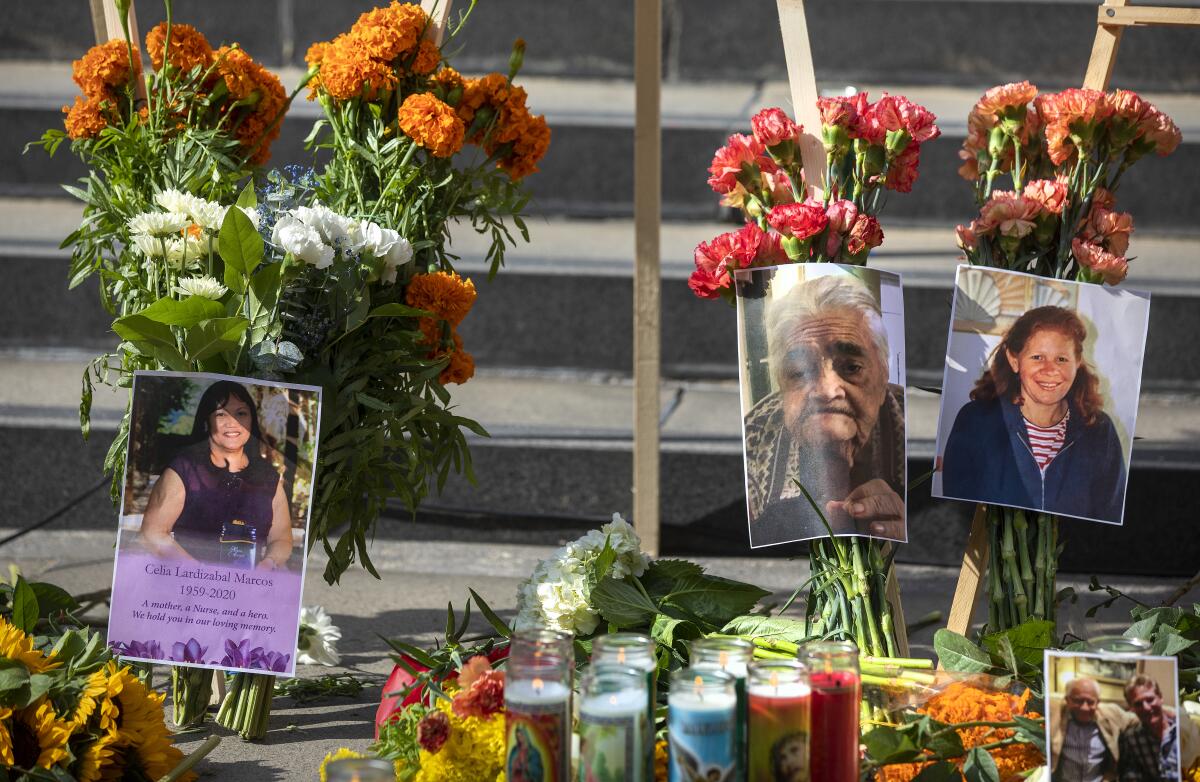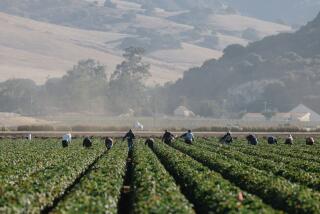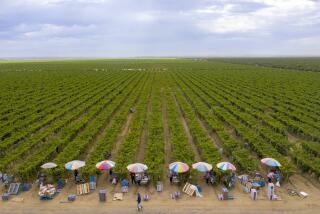This L.A. company was hit with the state’s largest-ever COVID-19 fine. Some say it’s a model for worker safety

- Share via
In late July, Gloria Lopez, a weight checker at a frozen food processing plant in Vernon, noticed that a plexiglass divider was missing between workers on the production line.
Two employees were left exposed to the coronavirus. Neither had said anything.
“I said to one of them, ‘Do you feel comfortable the way you’re working?’ And she said, ‘No, but what do you want me to do?’” Lopez recalled.
Within minutes, Lopez instructed an employee to hit a button to stop production. She told the line leader she belonged to a new safety committee at the plant owned by Overhill Farms, which has authorized the panel’s members to halt production if safety precautions were lacking.
About 10 minutes later, the divider was back.
“I thought to myself, ‘Yes, we can do something with our committee,’” said Lopez, from Huntington Park. “Yes, we can be safer where we work.”

The company and workers backed by a union formed the group in the midst of a serious problem. On Sept. 9, California’s Division of Occupational Safety and Health, known as Cal/OSHA, announced more than $200,000 in fines each for Overhill Farms and its temporary employment agency, Jobsource North America — the state’s largest fines to date for coronavirus health violations.
The citations, which reference more than 20 cases of the virus and one worker death, stem from inspections begun in April, which found the company failed to provide sufficient protective equipment, enforce physical distancing or inform workers about the dangers. They follow the first fines Cal/OSHA announced Sept. 4 for coronavirus safety violations, with penalties against 11 employers ranging from $2,025 to $51,190.
Overhill Farms and Jobsource have said they plan to dispute the citations. Overhill Farms called the allegations erroneous, asserting that Cal/OSHA falsely claimed the company failed to install plexiglass dividers.
“The health and safety of our employees is our first priority,” the company said in a statement. “Overhill Farms has not only taken steps in line with the constantly evolving federal, state and local guidance, we have gone above and beyond those recommendations as we developed our employee safety procedures.”
Since the committee was first convened in late July, six workers, a union liaison and company representatives have met almost weekly to discuss coronavirus safety. Some of these workers have said they’ve slowly seen improvements in enforcement of social distancing and feel safer on the job.
Labor advocates have highlighted Overhill’s safety committee as a precedent as the county’s Board of Supervisors moves forward on a motion that would allow workers to form public health councils authorized to report whether their employers are complying with coronavirus health orders — a proposal with widespread backing among labor groups but strongly opposed by many business leaders.
“It’s a common sense approach,” said Rob Nothoff, policy director for the L.A. County Federation of Labor. “You empower workers to help add additional capacity to the Department of Public Health and to serve as kind of enforcers or whistleblowers. Everyone is better off protected.”
County health officials said there had been 26 coronavirus cases from March through August at Overhill Farms. Most cases were in April, when 11 workers became sick.
Kathy Finn, secretary-treasurer for United Food and Commercial Workers Local 770, which represents several hundred Overhill employees, said she hoped the citation would send a sharp message to other workplaces.
“The fact that there have been some improvements now is I think a reflection of the fact the state took so long to actually do anything,” Finn said.
Armando Romero, a forklift operator and member of the safety committee, said that in the early days of the pandemic Overhill Farms failed to provide workers with masks. He took a 30-day leave, worried about the possibility of exposing his mother-in-law with whom he lived.
When he returned, the Maywood resident said that the company was providing masks but not enforcing social distancing or providing sufficient hand sanitizer.
“When coronavirus began, no one knew what rules to follow,” Romero said. “From there, we saw we needed to do something to protect ourselves.”
A group of workers with safety concerns approached their union, which proposed the idea of the committee to Overhill managers. Romero said that after the company began hearing the committee’s concerns, it moved to limit how many workers could enter a plant at a time and enforced social distancing during lunch breaks by adding plexiglass dividers to tables in the lunchroom and limiting seating.
Throughout the workday, the committee’s workers scan their areas to ensure dividers are in place and that employees wear face coverings and observe social distancing.
Rhina Blanco, a worker who lives in South Gate, said she joined the committee to protect her three daughters and husband and the families of her co-workers. Like Romero, she stopped going to work briefly because she said the company wasn’t providing adequate protective equipment.
To get her co-workers to keep their distance, she tells them, “I don’t want my family to get infected and I don’t want your family to get infected.”
Although she said the workplace still poses a dangerous environment, Finn acknowledged the committee has created a space to raise issues in an industry where workers often fear retaliation.
“Some of the things they accomplished was giving the workers a voice,” she said. “They got the ability to shut down the line when they saw unsafe things happening. That is a huge, huge power to stop production because that impacts the company in its pocketbook.”
In response to questions about whether the safety committee had led to improvements, Frank Polizzi, a public information officer for California’s Department of Industrial Relations, the parent agency of Cal/OSHA, said that as of the citation date the state “has not received proof that the COVID-19-related violations have been corrected by either employer.”
But in recent weeks, labor groups have pointed to the Overhill Farms committee as a model to support the motion supervisors are considering to create similar groups.
Under the current proposal, worker councils would pair with third-party organizations certified by the county Department of Public Health to document violations, with the goal of expanding the department’s enforcement capacity. Details of the program are still being developed, but Supervisor Mark Ridley-Thomas, who co-authored the motion initially approved in late July, said it should focus on industries with high rates of violations and outbreaks.
“The establishment of public health councils will provide another tool in the toolkit to better monitor, document and report public health violations,” said Ridley-Thomas at the board’s Sept. 1 meeting. “If we want to slow the spread, we need to do it in the context of a just economy.”
In an Aug. 6 letter to the board, Public Health Director Barbara Ferrer acknowledged concerns that employers might retaliate against workers who participate in the councils and suggested adopting rules to address that issue.
Tia Koonse, a legal and policy research manager at the UCLA Labor Center, said that, with too few county investigators, worker councils are a cost-effective measure to ensure compliance.
But the motion has faced staunch pushback from business leaders. In a letter to the board, the Los Angeles County Business Federation, known as BizFed, called the proposal “nothing more than another layer of cumbersome bureaucracy designed to harass employers at the whim of any disgruntled employee.”
It said that employees can already report noncompliance to a county hotline and that it would support the councils only “for the few bad actors that have been repeatedly warned and are still unable to comply.”
“We don’t really see any redeemable aspects to it,” Sarah Wiltfong, BizFed’s policy manager, said in an interview, adding that the proposal would result in the “de facto unionization of businesses.” Questions remain about how employers would compensate for worker councils meeting during business hours, she said.
Similarly, Patricia Torres Bruno, chief policy officer for the Los Angeles Area Chamber of Commerce, said the motion has been “rushed through the Board of Supervisors” with little input from the business community.
“It is not in a business’ best interest not to be compliant with the health orders,” Bruno said. “They are eager to open and open safely.”
Freddie Agyin, director of health and environmental control for the city of Vernon, said that when his staff visited Overhill Farms in mid-August, they noted only that plexiglass barriers needed to be extended farther on lunch tables and that more copies of health orders needed to be posted in areas employees frequent.
“They have made progress,” he said of the company.
Agyin said employee engagement around safety issues is key.
“You can’t implement things where you don’t have buy-in,” he said.
More to Read
Sign up for Essential California
The most important California stories and recommendations in your inbox every morning.
You may occasionally receive promotional content from the Los Angeles Times.











